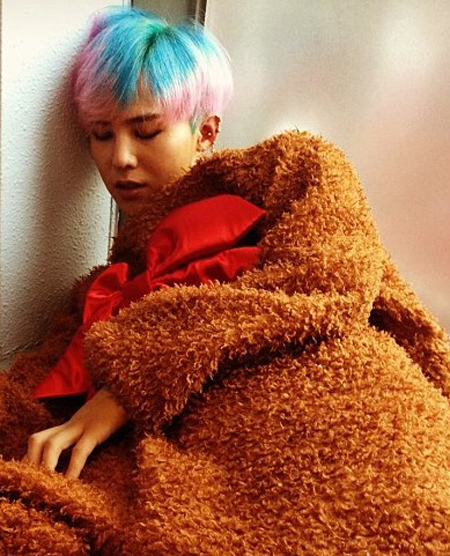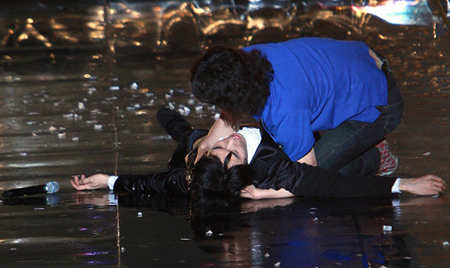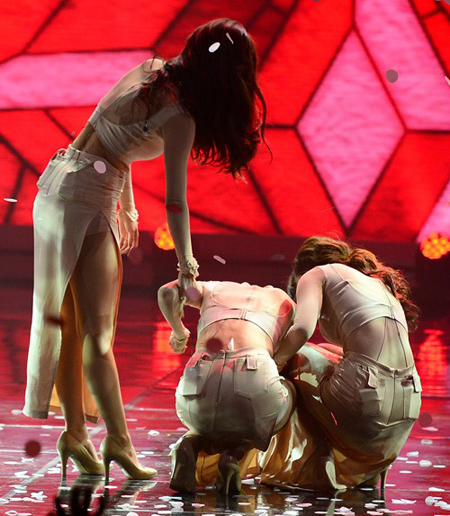- California Assembly OKs highest minimum wage in nation
- S. Korea unveils first graphic cigarette warnings
- US joins with South Korea, Japan in bid to deter North Korea
- LPGA golfer Chun In-gee finally back in action
- S. Korea won’t be top seed in final World Cup qualification round
- US men’s soccer misses 2nd straight Olympics
- US back on track in qualifying with 4-0 win over Guatemala
- High-intensity workout injuries spawn cottage industry
- CDC expands range of Zika mosquitoes into parts of Northeast
- Who knew? ‘The Walking Dead’ is helping families connect
The Price of Fame
K-pop stars continue to faint and collapse
By Park Si-soo
Hyeri of K-pop girl group Girl’s Day fainted on stage last month. HyunA of another girl group 4minute was taken to the hospital in May last year after collapsing in a rehearsal studio. Male soloist Bumkey experienced a similar accident last September.
There are so many other young and healthy entertainers in their early 20s who continue to suffer the same fate.
So what on earth happened to these people whose youth and fitness are part of their appeal?
Show business insiders say all of these disastrous accidents can be blamed on excessively grueling work schedules. Top stars normally find their workload exceeds their physical endurance capacity, they say, adding it’s only a matter of time for these hectic schedules to take a toll on their health.

In photo taken on Sept. 15, 2012, K-pop star G-Dragon is caught sleeping with his head against the wall at an unidentified place. (Korea Times files)
Despite these worries, they claim, there may be few entertainers who are willing to downsize their schedules.
“Popularity comes and goes quickly. Once gone, nobody can tell for sure that it will come again. That’s the nature of showbiz,” an industry insider said on condition of anonymity. “Given that nature, it looks quite natural for them (entertainers) to endure grueling schedules against all odds to make as much money as they can when they are in demand. Sometimes their schedule becomes so hectic that it harms their health. But that’s inevitable.”
By accident or not, K-pop kingpin Girls’ Generation’s June-July 2011 working schedule was leaked online. A look at the schedule gives one the real picture of what “grueling” means in the show business. Simply put, the band’s nine members worked during the two months without any break.
On June 8, they had a showcase in Tokyo. They jetted off to Taiwan the following day for another showcase. They flew to Paris on June 10 and then moved back to Japan two days later. Upon arriving there, the band resumed its concert tour in Tokyo, Hiroshima and several other Japanese cities. On July 13, the band was invited to a special stage at the Tokyo Dome. It hosted two last concerts of the Japanese tour between 17 and 18, and — finally — returned to Korea for two more concerts in Seoul between July 23 and 24.
“These were the group’s official schedules. It’s obvious that there were many unofficial events they had to attend to during the period,” the insider said. “In addition, they are required to rehearse almost every day to execute perfect performances on stage. Given all of these factors, I’m pretty sure that the members worked during the two months without a single day off.”
Popular boy band TXVQ’s schedule was much more “cruel.” According to the band’s December 2009 schedule, which was also leaked online, its members were forced to stay awake at night from Dec. 30 to Jan. 1 to participate in year-end festivals in Korea and Japan.
“TXVQ members slept only one or two hours a day,” read a memo attached to the schedule. “They traveled back and forth between Seoul and Tokyo from Dec. 27 to participate in prearranged events in the two countries. They were extremely exhausted on the last day of the year so that they barely took the last stage.”
Appearing on a nighttime talk show last month, Kim Wan-sun, a K-pop diva in the 1980s, said she had to risk her safety in order to meet her schedule during her heyday.
“I had to fulfill multiple engagements a day — one here and the next one at a far distant location. To arrive at the next destination on time, my driver had to drive the car very fast and often violated traffic rules. Whenever I think back, I still find my heart beating fast.”
Kim Gun-mo, another star musician in the 1990s, echoed a similar view, saying he had to rent a helicopter to fulfill his nationwide dates.

Popular rocker Kim Jang-hoon is lying on his back after losing consciousness during a concert in Boryeong, South Chungcheong Province, on June 28, 2008.
Girls at bigger risk
Young female singers are more exposed to health risks, insiders say.
“They are extremely sensitive to their body shape because they try to appeal to people with their sexiness,” said a music program director. “To highlight physical sexiness, they normally wear skimpy or figure-hugging dresses on stage. As a result, I was told that they engage in a rigorous diet every single day.”
The reality TV show “Cheongdam-dong 111,” aired by entertainment cable channel tvN, explicitly portrays the rigid demands of the diet programs female singers are compelled to follow.
One episode of the program showed how members of an up-and-coming K-pop girl group AOA struggle to maintain weight levels. In the said episode, the band’s lead vocalist Seolhyun was caught eating a piece of fried chicken at the band’s residence at night by her manager. Enraged by her late night eating, the manager reprimanded her saying, “Do you know how heavy you are? You are over 50 kilograms, aren’t you?” The manager ordered her to immediately shed some pounds, saying, “Being a top star is a title only goal-oriented hard working people can achieve.”
The height of Seolhyun, who turned 19, is said to be 167 centimeters. She was classified to be “underweight” by the body mass index (BMI), a standardized method of analyzing health based on her presumed weight, height and age.
Medical experts say excessive diet at a young age only increases the risk of health problems such as vertigo, constipation, loss of hair and metabolism disorders.
“Going on a tough diet seems to be something unavoidable for female entertainers,” said Kim Gang-sik, a medical doctor. “But they should know that if they lose their health, they lose everything. They need to come up with ways for balanced improvement with regards to beauty and health.”
















